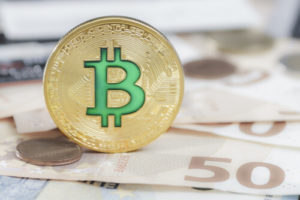 Bitcoin is the world’s first decentralized digital currency that allows individuals to send each other money directly without a central bank getting involved. Users exchange bitcoins easily over the Internet and pay minimal fees. Unlike credit, there are no prerequisites necessary to use bitcoins or arbitrary limits. Users can buy merchandise anonymously with a digital “Bitcoin wallet” that is the equivalent of a bank account. User transactions are only identified by a wallet’s ID, or account number.
Bitcoin is the world’s first decentralized digital currency that allows individuals to send each other money directly without a central bank getting involved. Users exchange bitcoins easily over the Internet and pay minimal fees. Unlike credit, there are no prerequisites necessary to use bitcoins or arbitrary limits. Users can buy merchandise anonymously with a digital “Bitcoin wallet” that is the equivalent of a bank account. User transactions are only identified by a wallet’s ID, or account number.
Bitcoins facilitate international transactions, particularly between citizens of countries with weak banking systems. In a country like Venezuela, a person can send bitcoins to a relative in the United States who may trade the bitcoins for U.S. currency in order to buy the relative goods that he may not have access to in Venezuela. While Bitcoin users enjoy many advantages, they may soon be limited to how they can use the currency in Florida due to the passing of new legislation that aims to treat Bitcoin like money under the state’s money laundering laws.
Bitcoin is Not “Real” Money
Currently, Bitcoin is not recognized as a legitimate currency anywhere in the world. States all have varying laws pertaining to the regulation of Bitcoin as government struggles to stay abreast of the new technology. The IRS considers Bitcoin deals barters and users have yet to pay taxes on Bitcoin transactions. All over the world, people use bitcoins to purchase legitimate goods; however, the security of using bitcoins entices criminals to use them to hide profits from illegal activities.
In 2016, Miami-Dade Circuit Judge Teresa Mary Pooler dismissed felony money laundering charges against Mitchell Espinoza, who allegedly sold and “laundered” $1,500 worth of bitcoins to undercover detectives. The detectives met with him on three occasions to receive the bitcoins that they claimed would be used to purchase stolen credit card numbers. The judge ultimately ruled that Bitcoin is not backed by any government or bank, and therefore was not tangible wealth; therefore, money laundering did not take place. The case is believed to be the first case in which a person was charged with money laundering for dealing in bitcoins.
Bitcoin Will be Treated Like Money to Curb Crime in Florida
This case spearheaded the efforts of Florida legislators to bring money laundering laws up to speed. The new law would include “virtual currency” in the list of monetary instruments covered under Florida’s Money Laundering Act. Supporters of the new law claim that treating bitcoins like money in Florida would ensure criminals cannot use it to conceal financial activities.
People of all stripes have used Bitcoin for a variety of purposes; in fact, there are a few restaurants in Miami that accept Bitcoin as payment. On the flip side, criminals have used it to buy, sell, and traffic illicit substances. Human traffickers and prostitutes have also been caught using Bitcoin to buy ads on Backpage.com, the classified website that enables the sex trade. Through this new law that treats Bitcoin as cash, Florida law enforcement personnel hope to curb crime.
At The Law Office of Gabriel & Gabriel, veteran defense attorney Brian Gabriel holds a strong reputation throughout South Florida in part because of his dedication to being up-to-date on all matters pertaining to serious felony crimes. He provides extensive, personalized attention to each and every criminal case that comes his way. Call (561) 622-5575 for a free case review or contact Mr. Gabriel online.


